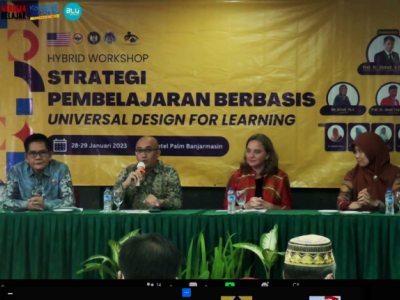The American Government Supports Inclusive Learning for Students with Disabilities

Factors that cause an inclusive classroom environment include the diversity of intellectual and social levels of students who are not accommodated. Therefore lecturers provide space for a variety of student background abilities. Lecturers need to integrate previous student experiences in learning and accommodate the diversity of student abilities. The quality of lecturer-student interaction, interaction between students and the way the lecturer expresses either encouraging or punishing, students' willingness to learn, willingness to ask for help (especially new students) are factors that have an impact on the learning climate. What needs to be avoided is microaggressions, is the uncomfortable treatment of friends as well as lecturers on individuals who are marginal in class, or things that are taken for granted on a daily basis, which we are not aware of makes our students feel 'demeaned'. This was said by a lecturer in special education study program, Faculty of Education, UNY, Pujaningsih, Ed.D, in a workshop on universal design-based learning strategies at Universitas Lambung Mangkurat. She further said that getting to know students and recognizing their uniqueness in class is a necessity. "Students are alert, they focus on threats to their feelings, they feel they are not part of the class and they have a low focus on learning because the curriculum does not suit the needs of students" she said, Monday (30/1). Lecturers should deliberately design student diversity involvement so that student individuality is valued and diverse student perspectives are included in class. And to avoid microaggressions is to recognize and reflect on biases in interactions and behavior, understand our triggers (what makes us uncomfortable and why) and focus on building class norms collaboratively with dialogue. Meanwhile, Nur Azizah, Ph.D said that disability barriers that are likely to exist in tertiary institutions include visual impairments, hearing impairments, physical barriers, learning disability, emotional and behavioral disorders, ADD/ADHD, Autism Syndrome Disorder (ASD) or mental disability. The lecturer at the FIP UNY Special Education Study Program revealed that the information processing model for each person with disabilities is different depending on their disability. Individuals with visual impairments receive input information through sound and process it in memory and then output it in the form of verbal sound. While the hearing impaired is stimulated through vision, processed in memory and then comes out in written form.
This workshop is a collaboration between the Teaching and Education Faculty of Teacher Training and Education Study Program (FKIP) Lambung Mangkurat University and AEIF (Alumni Engagement Innovation Fund) through the Improving Access of Universal Design for Learning in Higher Institutions with Students with Disabilities program funded by the United States through the American embassy Union (US) for Indonesia (U.S. Embassy). Deputy for Cultural Affairs of the US Embassy (Assistant Cultural Affairs Officer of U.S. Embassy) Mary Trechock said that the US Embassy has a strong commitment to working with Indonesia, especially in the field of education. “The US Government fully supports this program because the program's goals are in line with the values and goals of the Civil Rights Act which prohibits discrimination against individuals with disabilities (American with Disabilities Acts). We believe this program is appropriate and beneficial for all to create access for students with special needs," she said.
This activity was attended by 53 offline participants and 18 online participants who were in the zoom room from 33 universities in South Kalimantan and Yogyakarta. It was opened by the ULM Vice-Rector for Academic Affairs, Dr. dr. Iwan Aflanie, M. Kes, MH accompanied by the Dean of the ULM Teaching and Education Faculty (FKIP), Dr. Chairil Faif Pasani, M.Sc. The background of this activity is the opening of access to higher education for persons with disabilities according to Menristekdikti Regulation No. 46 of 2017 concerning Special Education and Special Education Services. The issuance of this regulation allows the entry of students with disabilities to study on campus, and campuses must prepare themselves to accept and then carry out an educational design that is suitable for them and also suitable for other general students. (Author: Dedy, Editor : Sudar, T:Adila)

